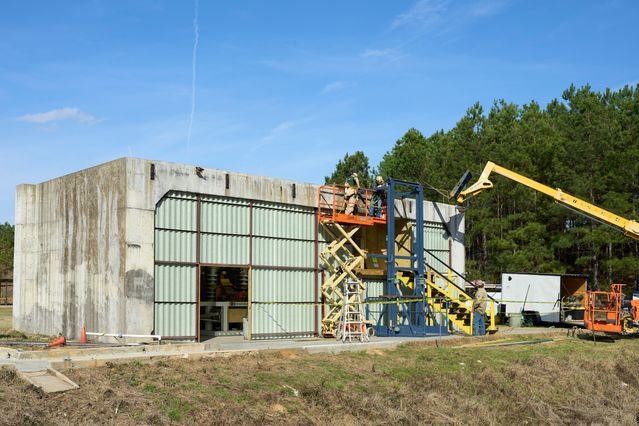Wall Street Journal Article Details the 2021 GOEX explosion and rebuild
Blackpowder enthusiasts are getting a first look at the Minden GOEX plant in some time this week as the Wall Street Journal has published an article detailing the uses of blackpowder by the American military and hobbyists around the country.
While the article is locked behind a ‘paywall’, some information from the article is still accessible online.

Photo credit: The Wall Street Journal
The article gives us some detail on the miltiary application on blackpowder, more than we’ve had publically shared before.
For a millennium, black powder was a crucial material for both military and commercial uses. Today, it is a specialty commodity with few commercial applications—mostly for rocket hobbyists—but it’s still used in more than 300 munitions, from cruise missiles, to bullets for M16 rifles, to the vital 155mm shells.
In each case, a small amount of black powder is used to detonate a more powerful explosive packed in the same bullet or missile. A 155mm shell for a howitzer, for example, will use half an ounce of black powder, lodged next to 26 pounds of a more powerful explosive.
Sales volume is limited and that means profits can be too thin to support more than a single production facility. This type of vulnerability is so common, the Pentagon describes it as the “single source” problem. Only one foundry in the U.S. makes the titanium castings used in howitzers, and only one company makes the rocket motor used in the Javelin antitank weapon widely used in Ukraine.
We’ve known for some time that the military had a use for blackpowder, but NDAs and contracts kept public knowledge of it’s use limited. At least now we have some idea of how the military uses blackpowder, and why they invested 3.6 million in taxpayer dollars to get the GOEX plant back online.
The Minden mill, as a fifth-tier supplier, was deep down the defense supply chain. Given black powder’s importance, the Army in this instance noticed right away, according to people familiar with the matter. It still took months for the new owner to take over, and by the time Estes began refurbishing the mill, yellow wildflowers had sprouted in the factory yard.
The latest update shared in the article comes from February, 2023, where Estes speaks briefly of the upgrades the facility;
In February, Estes company officials touring the facility pointed to upgrades to the mill. It now has a new, state-of-the-art fire suppression system, a shiny network of metal pipes and water guns aimed at the points of production vulnerable to the sparks that caused the 2021 accident.
The previous month Estes had restarted production of an inert black powder substitute as a safety test, before it resumes production of the real thing. The launch has been delayed a number of times, once recently when a water main broke in the middle of the factory grounds.
“Whenever you turn on old machinery that has stood for a while, [there] tends to be something that breaks,” said Karl Kulling, chief operating officer of Estes Energetics. “So we’ve gone through basically each machine and fixed up things here, there and everywhere.”
The article speaks very lightly, about 4 words, of the muzzleloading application of blackpowder, but it does gives us some context as to where Estes and the GOEX line is. It’s the first time we have heard of reasons for the delays in production and it’s the first time many of us have seen photos of the Minden plant.
Many are waiting for GOEX to return to shelves, others have moved on to other brands or are even making their own powder for their muzzleloaders. Wherever you are in your muzzleloading journey, I hope you find the article and it’s information interesting.

In this exclusive interview, Hogdon VP of Sales and Marketing Aaron Oelger answers questions about the decision to close and sell GOEX Blackpowder



















